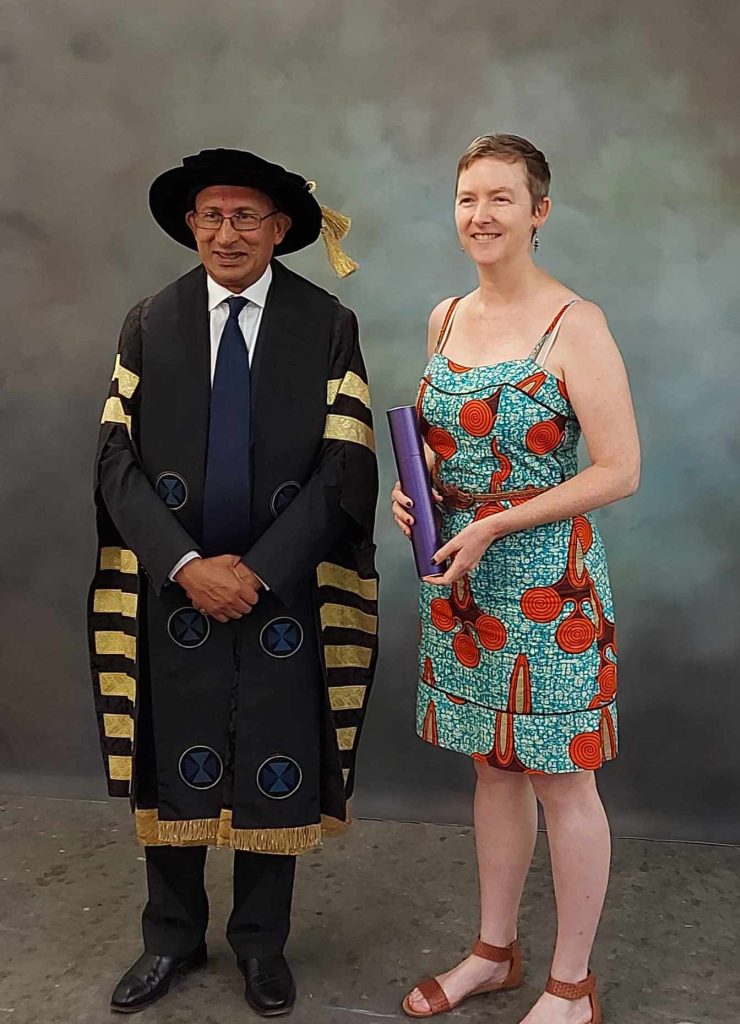By Sam Rowe
Content notice: Disability symptoms
Yesterday I graduated from my Master of Museum Studies degree at The University of Queensland (UQ).
It has been a long 7-year journey for me. I started in 2017, acquired my neurological disability in 2019, took a few years off, then undertook my thesis over 1.5 years.
The first year of my break was learning how to live with my new normal. After that I was keen to start my thesis, however I was only able to sit at a computer for 15 minutes before my symptoms, such as concentration issues, brain fog, thinking problems, word finding difficulties, myoclonus jerking, tremors, stuttering, and chronic fatigue kicked in. This was from the bright computer screen (even with the brightness turned down) and thinking and concentrating.
I spoke to my neurologist about wanting to do my thesis so I could finish my Masters, and the troubles I was having. He told me that perhaps my brain simply was not ready yet and I should wait a while longer.
Well, I thought, “Nope! I am not accepting that!” (there were some profanities used). So, I started retraining my brain, little by little daily. I did meditation often to help calm my brain from going into shock about what I was putting it through, and slowly increased my computer and study time. I took regular breaks and listened to my brain and body when it had had enough.
I wanted to try studying something a bit more manageable first, so I did a Certificate IV in Leisure and Health – which was learning how to work with people with disabilities, and develop and facilitate leisure programs that took their interests and health conditions into consideration. The TAFE team were so supportive, and I got every extension that I applied for, which were many!
Then I asked an amazing UQ academic to assist me on my thesis journey. She was so amazing, helped me every step of the way, worked with my fatigue, word finding difficulties, concentration issues, and when I went into a flare and had to take a few months off. She advocated for me with UQ when I needed a 3-month extension, and they were being difficult. I could not have asked for a better mentor to walk beside me on my journey. Thank you!
Graduating from a degree for anyone is a monumental achievement. For people with disabilities, particularly those of us who experience daily fluctuating symptoms, it is more so. I regularly say to myself that my disability does not define who I am. It slows me down, and I have had many hurdles along the way, but with determination and a “I’m going to do this” attitude, I made it to the other end.
Thank you so much to UQ Graduations team. After a few months of back-and-forth communications, they organised a low sensory graduation for me. No ceremony, no music, no bright lights or camera flashes, no crowds. I didn’t even want the robe. Just a photo with Chancellor Peter Varghese, and I was done.
Now a break before I start applying to universities to do a PhD.
My words of wisdom to anyone who has daily struggles with their disability, who is still learning their new normal, and who has a goal and thinks that it is not achievable. Don’t give up. There are good(ish) days, and bad days. Advocate for yourself. Be patient, be kind to yourself, keep trying, find different ways to get to your goal, and remember that your disability does NOT define who you are. You are amazing, resilient, and determined. Simply having a disability and living with daily symptoms, discrimination, stigma, and doubt from others proves that you can do it. Remember that it is a journey, with mountains, winding roads, rocky tracks, and interesting scenery. Don’t give up on something you want.
About the Author
Sam Rowe (she/her) is a disability and diversity advocate and consultant, arts worker, and a person with a neurological disability. She is enthusiastic about sharing her lived experience and knowledge, and helping the galleries, libraries, archives, museums (GLAM) sector enhance its accessibility, resources and disability inclusion awareness to create more inclusive practices to support equitable participation for people who identify as being deaf, neurodivergent, having a disability or a mental health condition. Sam’s background in photography, project management, accessibility, libraries and public programming gives her an understanding of the GLAM sector and its needs, and international best practice for access and inclusion initiatives and programming.
Connect with Sam via LinkedIn: https://www.linkedin.com/in/samprowe/

